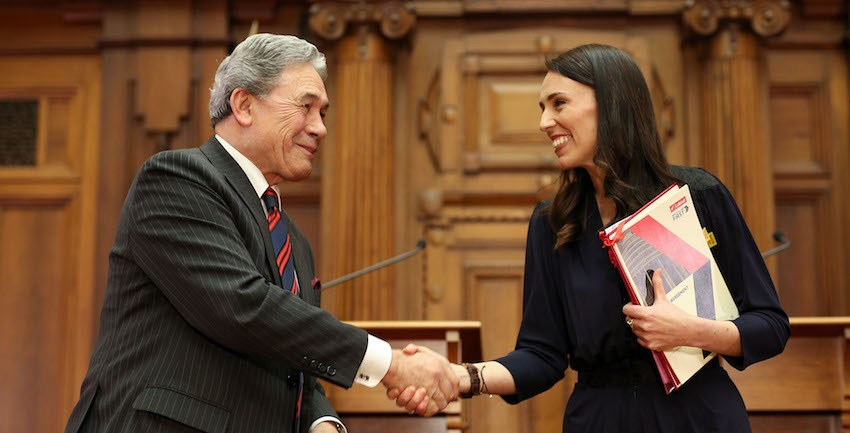By Matt Fletcher
The incumbent Government’s proposed Electoral (Integrity) Amendment Bill passed its first and second readings earlier this year and has strengthened its place as a point of contention within Parliament. The colloquially-named “Waka-Jumping Bill”, if signed into law, would seek to drastically alter the face of New Zealand’s legislature, as well as the landscape of party politics.
Waka-Jumping — History and Controversies
“Waka-jumping” in New Zealand refers to the act by which a sitting Member of Parliament changes their party affiliation between elections [1]. Waka-jumping is not an uncommon part of New Zealand’s parliamentary history. The practice, however, has become increasingly persistent since the 1980’s, especially since the introduction of the mixed-member proportional (MMP) electoral system. The 1989 departure of Labour MP Jim Anderton, who formed his own NewLabour Party, is a prominent example [2]. Furthermore, in 1998, eight New Zealand First MPs left their Party following the breakdown of the National-NZ First Coalition, becoming Independent Members [3].
Waka-Jumping has attracted a significant degree of criticism, mainly as a consequence of its impact on the representation of parties. For instance, five of the eight aforementioned renegade NZ First MPs later became members of the Mauri Pacific Party, and consequently this Party, despite having never won any seats in a general election, briefly held significant parliamentary representation [4]. This prominent example, and other instances of waka-jumping, have bolstered the notion that the practice openly disregards the will of voters, and effectively distorts the composition of democratically-elected parties in the House of Representatives [5].

Past legislation has tried to deal with the rising prevalence of waka-jumping. The Fifth Labour Government, in the midst of an electoral climate heavily influenced by the beginnings of MMP, introduced the Electoral (Integrity) Amendment Act 2001 [6]. This piece of legislation was intended to amend the Electoral Act 1993 in an effort to both “enhance public confidence in the integrity of the electoral system” and to maintain the proportionality of party representation as chosen by the voting public of New Zealand [7]. Under the Act, if a member of Parliament ceased to be a member of the party under which they were elected, then their seat would be vacated [8]. Moreover, for the leader of a party to eject a member from caucus, they had to have the support of at least two-thirds of the party’s sitting MPs [9]. The 2001 Act carefully included a sunset clause, noting that its provisions were to expire on “the close of polling day for the second general election held after the date”, which ended up being the 17th of September, 2005 [10]. Following the General Election of that year, and the subsequent confidence and supply agreement reached between Labour and NZ First, the Government sought to reintroduce the Act and its provisions, in an effort that was ultimately blocked by National, Act, United Future, the Māori Party, and most notably the Green Party [11].
The Legislation in Question
Currently, the Electoral (Integrity) Amendment Bill 2018 is being reviewed before the Committee of the Whole House, as another effort to restrict waka-jumping. [12]. This Bill, overseen by Justice Minister Andrew Little, is nearly identical to the 2001 Act. [13]. One crucial difference between the 2001 Act and the Bill before the House is that the latter does not include a sunset clause [14]. As such, the provisions of the Act will remain intact unless they are repealed by a successive Parliament.
The Government Bill was introduced on December 13th 2017, as part of the Coalition agreement between the governing Labour and NZ First Parties [15]. Deputy Prime Minister and NZ First Leader Winston Peters stands as a strong proponent of the Bill, deeming it “a matter of honouring the support of other members and alongside that the electorate who voted for us” [17]. Peters has consistently adopted a staunch position on ensuring that party representation in parliament is backed by a public mandate, beginning with his resignation from the National Party in 1993, upon which he also resigned from parliament, and then won the resulting by-election as an Independent [18]. Later, Peters strongly supported the original Amendment Act of 2001, and as previously mentioned, sought to reintroduce the Act as part of the 2005 confidence and supply agreement between Labour and New Zealand First.

The Green Party, who entered a confidence and supply agreement with the Labour Party after the 2017 Election, have also backed the Bill, in a move has attracted a great deal of both interest and backlash, considering that the Party famously opposed previous versions of the legislation [19]. The Party’s tone surrounding their decision, however, has been highly reluctant. Green MP Eugenie Sage, for instance, likened her Party’s support of the Bill to swallowing “a dead rat” [20]. Meanwhile, co-leader Marama Davidson has openly stated her Party’s lack of adoration for the Bill but has regarded their support for it as a necessary compromise to ensure stability between the three governing parties [21].
The Opposition
The Sixth Labour Government’s revival of waka-jumping legislation has not been met without significant backlash from the Opposition. Following the Bill’s introduction, then-National Party leader Bill English decried the legislation as ‘dangerous’, asserting that such a law would grant the leaders of political parties an excessive amount of power [22]. If an MP was removed from caucus by the Party leader, they would also be removed from parliament. As asserted by English, the legislation would grant party leaders the power to determine “who is in parliament and who is out of parliament” [23]. In addition, Nick Smith, a National MP and member of the Justice Committee, has highlighted that all of the public submissions that were received by his select committee have opposed the Bill. He further stated that the requirement of a party leader to have the backing of two-thirds of their caucus before dismissing a sitting MP is an insufficient safeguard against granting leaders too much power [24].

Concerns surrounding the Bill have not extended only to the official Opposition. The Green Party’s less-than-enthusiastic backing of the legislation has been made clear, and as previously stated, their former leaders had viciously opposed the Bill’s older manifestations. The late Rod Donald, during the second reading of the 2001 Bill, overtly described it as “the most draconian, obnoxious, anti-democratic, insulting piece of legislation ever inflicted on this parliament” [25]. Jeanette Fitzsimons, who served as co-leader alongside Donald for a decade, further opposed efforts to restrict waka-jumping during her Parliamentary tenure, and has made her rejection of her party’s backing of the modern Bill clear, stating fears of the Green Party potentially engaging in a “trade-off” of its core principles in exchange for smaller policy gains [26]. Ahead of the Green party’s annual conference, Fitzsimons, as well as former Green MP Sue Bradford, spoke favourably of a potential motion to forbid Green MPs from supporting the Bill [27].
The Electoral (Integrity) Amendment Bill 2018 is overwhelmingly likely to pass its third reading and assert itself as the law of New Zealand in the foreseeable future. However, the long and contentious history of waka-jumping in New Zealand, in addition to the staunch opposition to the Bill from both the left and the right, ensure that the issue will not be laid to rest upon the ratification of a single piece of legislation.
[1]https://www.radionz.co.nz/national/programmes/the-house/audio/2018657375/what-is-the-waka-jumping-bill
[2]https://www.radionz.co.nz/news/political/346497/waka-jumping-law-plan-dangerous-english
[3]https://www.stuff.co.nz/national/politics/98199369/why-winston-wants-to-stop-waka-jumping–again
[4] https://www.nzherald.co.nz/nz/news/article.cfm?c_id=1&objectid=12044539
[5]https://www.stuff.co.nz/national/politics/98199369/why-winston-wants-to-stop-waka-jumping–again
[6] http://www.nzlii.org/nz/legis/hist_act/eaa20012001n105328.pdf
[7] Ibid.
[8] Ibid.
[9] Ibid.
[10] Ibid.
[11]https://www.nzherald.co.nz/nz/news/article.cfm?c_id=1&objectid=10351637
[12]https://www.radionz.co.nz/national/programmes/the-house/audio/2018657375/what-is-the-waka-jumping-bill
[13]http://www.legislation.govt.nz/bill/government/2005/0003/latest/whole.html#DLM947312
[14]https://www.radionz.co.nz/national/programmes/the-house/audio/2018657375/what-is-the-waka-jumping-bill
[15]https://www.radionz.co.nz/news/political/349289/waka-jumping-bill-will-hurt-nz-s-reputation-national
[16]https://www.parliament.nz/en/pb/bills-and-laws/bills-proposed-laws/document/BILL_75706/electoral-integrity-amendment-bill
[17]https://www.stuff.co.nz/national/politics/98199369/why-winston-wants-to-stop-waka-jumping–again
[18] https://www.odt.co.nz/opinion/nzs-greatest-waka-jumpers-all-time
[19] Ibid.
[20]https://www.radionz.co.nz/news/political/362711/green-party-to-vote-for-waka-jumping-bill
[21]https://www.radionz.co.nz/news/political/362771/green-party-co-leader-marama-davidson-on-waka-jumping-bill-we-have-to-compromise
[22]https://www.radionz.co.nz/news/political/346497/waka-jumping-law-plan-dangerous-english
[23] Ibid.
[24]https://www.radionz.co.nz/news/political/356605/public-against-waka-jumping-bill-nick-smith
[25]https://thespinoff.co.nz/politics/05-02-2018/my-old-party-is-betraying-its-own-proud-history-on-the-waka-jumping-bill/
[26]https://www.stuff.co.nz/national/politics/106380985/waka-jumping-former-mps-hopes-greens-conference-will-make-party-pull-support
[27] Ibid.
The Public Policy Club is a non-partisan club at the University of Auckland that aims to encourage, educate and involve students from all backgrounds in the education and development of political knowledge. The views and opinions expressed in this article are those of the author and do not necessarily reflect those of PPC.




